Uneasy Lies the Head that Wears the Homburg Hat
An Analysis of Leadership Qualities and Theories Between Shakespeare's Henry V and Sir Winston Churchill
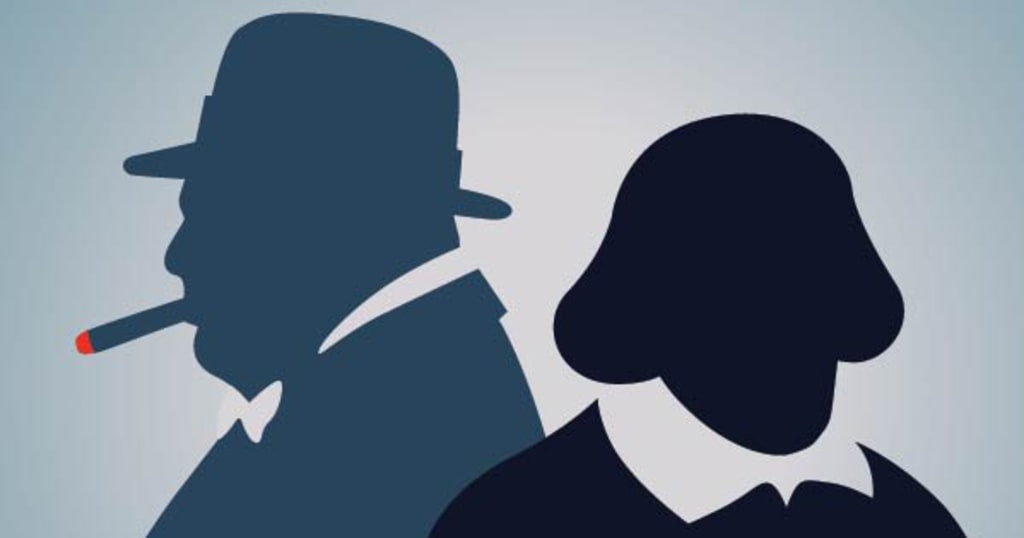
People say that the works of William Shakespeare are analyses and reflections of our human condition; whether of the story is about doomed love, political ambition turned to bloodshed, or situational humor which turned the simplistic things of life into the funniest of material. Yet, very rarely can people see such reflections of life in Shakespeare, which can also be made in real history. After all, Shakespeare himself was not a historian. He was a starving playwright who wrote propaganda pieces to entertain and (partially) educate the plebeians and royals of Elizabethan England. However, such characters such as Richard III, Marc Antony, and Prince Hal (King Henry V) can be reflected in terms of their styles of personality and leader ship in numerous figures throughout our history, whether if such people brandished a sword and crown or a cigar and glass of whiskey. The purpose of this essay is to examine how the leadership theory of how leaders are made, not born, can be seen in the works of British literature (The Henriad: Henry IV Part 1, Henry IV Part 2, & Henry V) and can also transcend into real figures of England’s history (Sir. Winston Churchill).
At first glance, both of these leaders have extremely obvious similarities. Henry V was the king of England who sought to conquer France and was faced with the inner challenge of living in the shadow of his father (King Henry IV). Sir. Winston Churchill was a soldier, Lord of the Admiralty, a member of Parliament on both sides of the political spectrum, and Prime Minister, who was faced with the challenge of saving both Britain and Western Europe from conquest by an axis of fascism and hatred. One was idealistic and fit, while the other was controversial and gluttonous (which ironically sounds more appropriate for the role of Sir. John Falstaff). However, they were able to wield the words of the human tongue as if they were weapons of war, and adopted a sense of bold and brash risk taking in order to seize the utmost necessity of victory; and in order to master these renowned skills, both of these people had to embark on physical and mental journeys to become the leaders for which they are remembered by millions today (on stage and in the annals of history) through trials of fire and tribulation.
Upon the birth of upbringing of Prince Hal of Wales under King Henry IV, Hal never had any ambitions of acquiring or bearing the crown of England. This was because of how he never felt he or his father deserved such a title or regal responsibility (after all Henry IV volently usurped King Richard II in order to claim the throne for himself; establishing a new era for England, with a king bearing blood on his hands). And because Hal cannot fully love his father for how the achieved his position of power, he prefers to abandon his duties as a member of the royal court and live amongst the more rough and tumble men and women of London (gamblers, drinkers, prostitutes, liars, and cheats); which closely mirrors the youth of Winston Churchill. For even though he was brought up in the top tier of British aristocracy, he resented life in a stuffy classroom and sought to openly deviate from the social norms of the social hierarchy; preferring instead for adventure with the British Army in the more rough and tumble environments of the world (Cuba, India, Sudan, and South Africa); only for both to realize that their senses of youthful and roguish invincibility will inevitably disappear and must later recognize the necessity to become real men of honorable character.
"PRINCE HAL: I know you all, and will awhile uphold the unyok'd humour of your idleness. Yet herein will I imitate the Sun, who doth permit the base contagious clouds to smother up his beauty from the world, that, when he please again to be himself, being wanted, he may be more wonder'd at, by breaking through the foul and ugly mists of vapours that did seem to strangle him. If all the year were playing holidays, to sport would be as tedious as to work; But, when they seldom come, they wish'd-for come, and nothing pleaseth but rare accidents. So when this loose behaviour I throw off, and pay the debt I never promised, by how much better than my word I am, by so much shall I falsify men's hopes; and, like bright metal on a sullen ground, my reformation, glitt'ring o'er my fault, shall show more goodly and attract more eyes than that which hath no foil to set it off. I'll so offend to make offense a skill, redeeming time when men think least I will." (The Complete Works of William Shakespeare, 2014, p. 460)
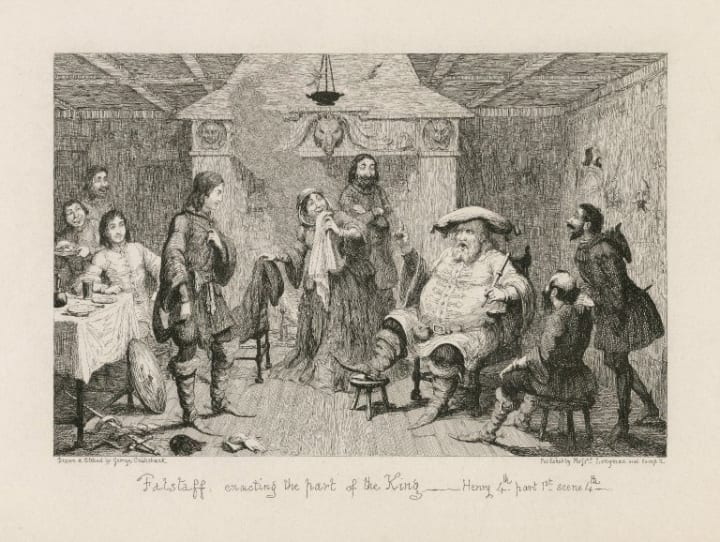
"The want of a sufficient supply of active service was therefore acutely felt by my contemporaries in the circles in which I was called upon to live my life. This complaint was destined to be cured, and all our requirements were to be met to the fullest extent. The danger (as the subaltern regarded it), which in those days seemed so real of Liberal and democratic governments making war impossible was soon to be proved illusory. The age of peace had ended. There was to be no lack of war. There was to be enough for all. Aye, enough and to spare. Few indeed of the keen, aspiring generations of Sandhurst cadets and youthful officers who entered the Royal Service so light-heartedly i these and later years were to survive the ghastly surfeit which Fate had in store. The little tidbits of fighting which the Indian frontier and Sudan were soon to offer, distributed by luck or favor, were fiercely scrambled for throughout the British Army. But the South African War was to attain dimensions which fully satisfied the need of our small army. And after that the deluge was still to come!" (Churchill, 1930, p. 84)
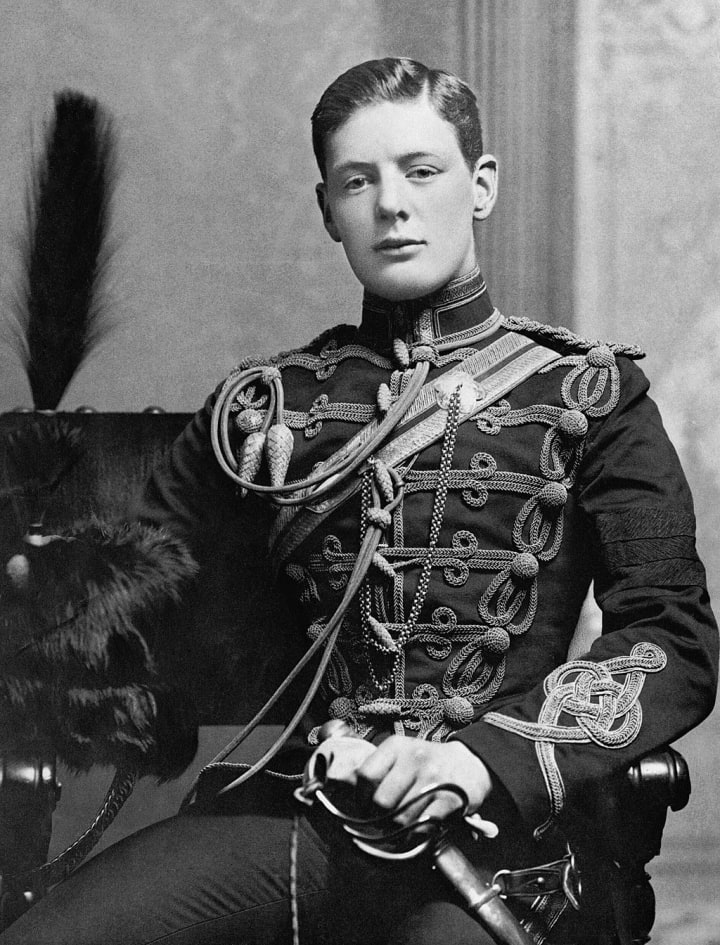
However, as both of these people progress into adulthood, such necessity to embrace reality and abandon their youthful fantasies hit them like a rock to their skulls. The calling of arms against the rebel Henry Percy (Hotspur) at the Battle of Shrewsbury and the outbreak of the First World War acted as the most proper immersions into such reality for both Hal and Churchill. For Prince Hal, his role at the Battle of Shrewsbury would act as a baptism of fire; demonstrating his abilities to lead his fellow men into battle and bring about victory on the field and to use the element of urgency and the need to obtain victory for the security of his royal title but also to satisfy his father, as a proper drive of vigor to fight to the end and emerge victorious.
However his ability to lead troops and secure the crown only amounted to the loss of faith in his tavern friend turned cowardly man at arms (Falstaff) and the further complication of his relationship with his dying father; while at the same time, acts as a lesson in who he can trust and who he must set aside, upon his inevitable coronation as King Henry V and responsibility of leading the English against France amidst what would be known as the Hundred Years War.
"FALSTAFF: My King, my Jove, I speak to thee, my heart!
KING HENRY V: I know thee not, old man. Fall to thy prayers. How ill white hairs become a fool and jester. I have long dreamt of such a kind of man, so surfeit-swelled, so old, and so profane; but being awaked, I do despise my dream. Make less thy body hence, and more thy grace; leave gormandizing. Know the grave doth gape for thee thrice wider than for other men. Reply not to me with a fool-born jest. Presume not that I am the thing I was, for God doth know so shall the world perceive that I have turned away my former self. So will I those that kept me company. When thou dost hear I am as I have been, approach me, and thou shalt be as thou wast, the tutor and the feeder of my riots. Till then I banish thee, on pain of death, as I have done the rest of my misleaders, not to come near our person by ten mile. For competence of life I will allow you, that lack of means enforce you not to evils. And, as we hear you do reform yourselves, we will, according to your strengths and qualities, give you advancement. (to CHIEF JUSTICE) Be it your charge, my lord, to see performed the tenor of my word. Set on." (The Complete Works of William Shakespeare, 2014, p. 530)
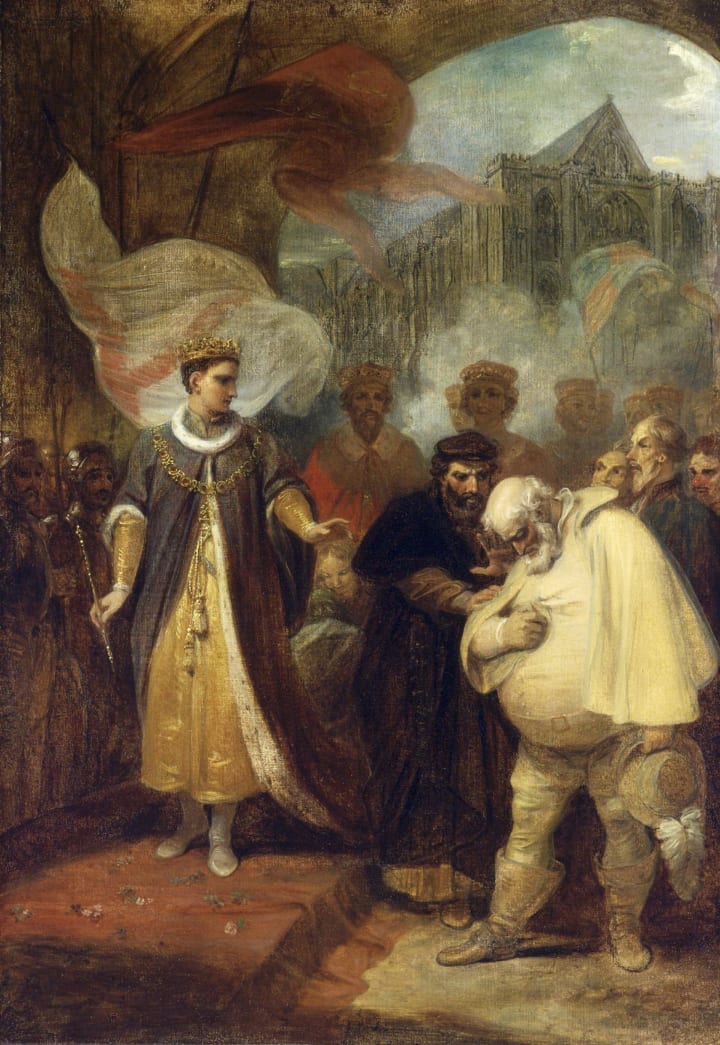
In the case of the young Churchill, his baptism of fire would be marked by short-term positions in government and also by extreme military failure. In 1904, Winston was elected to serve in Parliament under association of the Liberal Party; however as Lord of the Admiralty, following the outbreak of the First World War, he oversaw the failed 1915 naval invasion of the Ottoman Empire at Gallipoli (costing the lives of over 300,000 soldiers). After being fired from his desk job in the Royal Navy, he sought to redeem himself by serving as a Lieutenant Colonel for the British Army; yet his time in the war-torn trenches of France lasted no less than a year. Following the signing of the Versailles Treaty, Churchill returned to Parliament in 1924 and continued to serve until 1940 (but switched political loyalties to the Conservative Party; forging alliances with fellow Conservative member, Leo Amery, the Prime Minister, Neville Chamberlin, and First Earl of Halifax, Edward Wood).
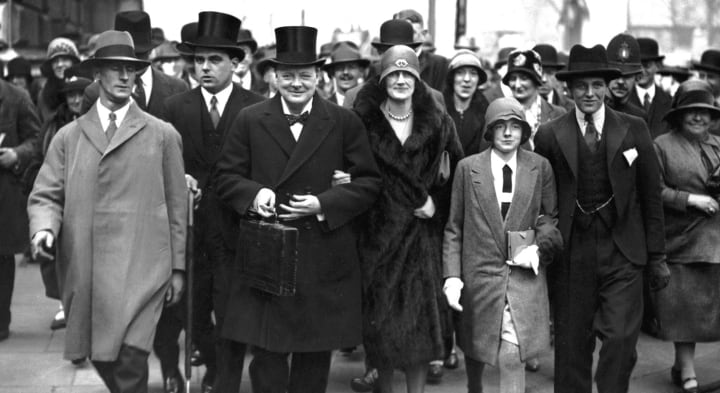
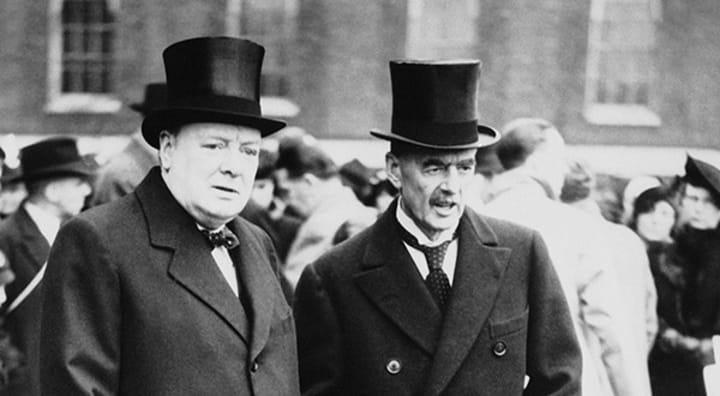
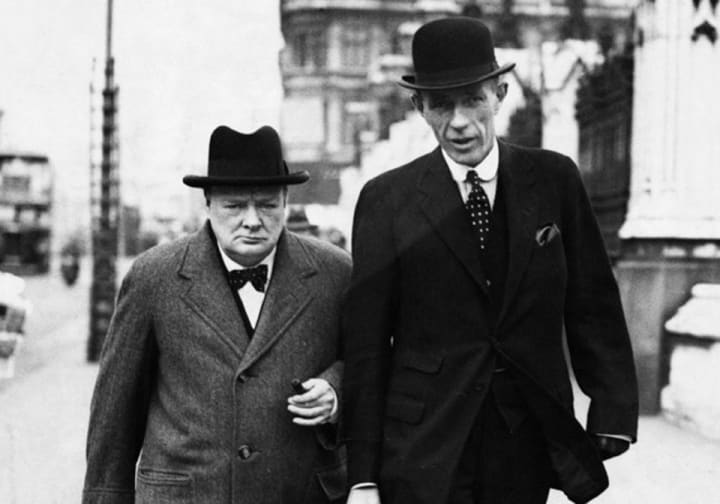
Though, much like the falling out between Prince Hal and his roguish friends in the days following his coronation, Churchill’s friendships and alliances within Parliament would be tested and exposed, following the rise of Nazi Germany, the failed Munich Agreement of 1938 (between Prime Minister Chamberlin and Adolf Hitler) and the German blitzkrieg invasions of Western Europe, Winston Churchill would have to face the challenge of being the new Prime Minister of Britain, while also fighting his own personal two-front war; one front being the scorched earth of Nazi occupied Europe, and the other being his personal contemplation of his trust and loyalty towards his former allies in government.
"Poland was attacked by Germany at dawn on September 1. The mobilization of all our forces was ordered during the morning. … I was surprised to hear nothing from Mr. Chamberlain during the whole of September 2, which was a day of intense crisis. I thought it probable that a last-minute effort was being made to preserve peace; and this proved true. However, when Parliament met in the afternoon, a short but very fierce debate occurred, in which the Prime Minister’s temporizing statement was ill-received by the house. When Mr. Greenwood rose to speak on behalf of the Labor Opposition, Mr. Amery from the Conservative benches cried out to him “Speak for England.” This was received with loud cheers. There was no doubt that the temper of the House was for war. I even deemed it more resolute and united than in the similar scene on August 2, 1914." (Churchill, 1948, p. 405 - 406)
"From the benches behind the government, Mr. Amery quoted amid ringing cheers Cromwell’s imperious words to the Long Parliament: “You have sat too long here for any good you have been doing. Depart I say, and let us have done with you. In the name of God, go!" (Churchill, 1948, p. 659)
Yet, it is in the most perilous moments of their country’s fate, both of these men would put their skills in people and power to the ultimate test; as if both of their lives were building up to these points, and if they were to fail, they would most certainly become dishonored footnotes in British and human history. For King Henry V, it was the Battle of Agincourt, and for Prime Minister Winston Churchill, it was his address before Parliament before the London Blitz. By 1415, King Henry V had to concentrate his statesman duties to the ongoing war between England and France which was previously being silently waged by his father, amidst the threat of Hotspur’s rebellion. As a means of solidifying English claims to French territory (once controlled by Henry’s great-grandfather, King Edward III), Henry and an army of 12,000 soldiers invaded France and successfully besieged the port city of Harfluer. Yet, this victory would have rather extreme costs in the long term. For the sacking of the city costed the lives of a quarter of his entire invasion force and a French reprisal of 30,000 knights under Marshal Jean Le Maingre and Constable Charles d’Albert. With only 9,000 men garrisoned on the field of Agincourt, their odds of a secondary victory looked slim to none; as the men’s spirit to continue the fight is on the brink of disappearance. This is when King Henry arrives on the scene and lets his sense of lifetime developed leadership shine. He reminds his fellow warriors of the true rewards of serving England upon the feast day of Saint Crispian; for regardless if they live to see victory or face eternity by the sword, their names shall forever be celebrated and galvanized as a worthy band of heroes and martyrs; as long as they are willing to stand and fight alongside their king. For if more men are resolved to abandon the field rather than stand their ground with him, the more cheers and cries of heroic praise shall be theirs who stay and brandish their weapons against the Frenchmen.
"KING HENRY V: What’s he that wishes so? My cousin Westmoreland? No, my fair cousin; if we are mark’d to die, we are enow to do our country loss; and if to live, the fewer men, the greater share of honor. God’s will! I pray thee, wish not one man more. By Jove, I am not covetous for gold, nor care I who doth feed upon my cost; it yearns me not if men my garments wear; such outward things dwell not in my desires. But if it be a sin to covet honor, I am the most offending soul alive. No, faith, my coz, wish not a man from England. God’s peace! I would not lose so great an honor as one man more methinks would share from me for the best hope I have. O, do not wish one more! Rather proclaim it, Westmoreland, through my host, that he which hath no stomach to this fight, let him depart; his passport shall be made, and crowns for convoy put into his purse; we would not die in that man’s company that fears his fellowship to die with us. This day is call’d the feast of Crispian. He that outlives this day, and comes safe home, Will stand a tip-toe when this day is named, and rouse him at the name of Crispian. He that shall live this day, and see old age, will yearly on the vigil feast his neighbors, and say ‘Tomorrow is Saint Crispian.’ Then will he strip his sleeve and show his scars, and say ‘These wounds I had on Crispian’s day.’ Old men forget; yet all shall be forgot, but he’ll remember, with advantages, what feats he did that day. Then shall our names, familiar in his mouth as household words- Harry the King, Bedford and Exeter, Warwick and Talbot, Salisbury and Gloucester- be in their flowing cups freshly remembered. This story shall the good man teach his son; and Crispin Crispian shall ne’er go by, from this day to the ending of the world, but we in it shall be remembered. We few, we happy few, we band of brothers; for he to-day that sheds his blood with me shall be my brother; be he ne’er so vile, this day shall gentle his condition; and gentlemen in England now-a-bed shall think themselves accursed they were not here, and hold their manhoods cheap whiles any speaks that fought with us upon Saint Crispin’s day." (The Complete Works of William Shakespeare, 2014, p. 557)
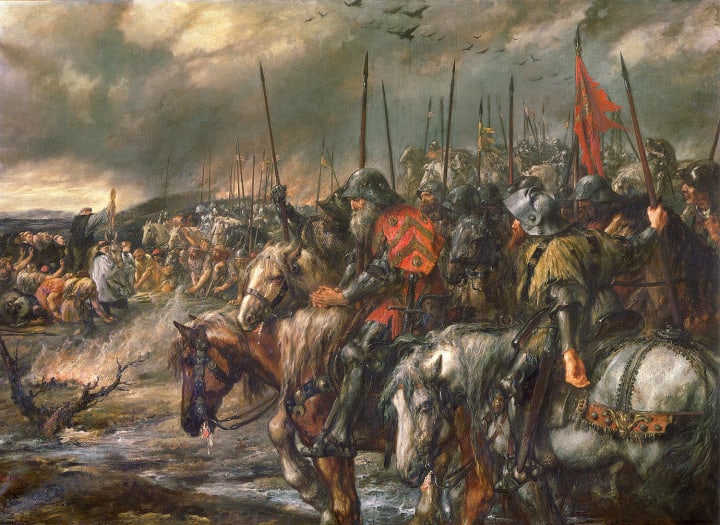
In the case of Prime Minister Churchill, his own Agincourt would be on the field of Parliament and in the place of the impending army of French knights was the pressure of thousands of German Luftwaffe bombers were ready to make the city of London look like the burt side of a piece of toast. It was amongst the aftermath of the emergency evacuation of Dunkirk and the fear of England being the next country to lose its sovereignty to the might of the fascists, which only further emboldened Churchill to rally Parliament and the people of Britain alongside him in defiance of Hitler; in (arguably) his most famous speech to be eloquently written and orated by his mind and tongue.
"I have, myself, full confidence that if all do their duty, if nothing is neglected, and if the best arrangements are made, as they are being made, we shall prove ourselves once again able to defend our Island home, to ride out the storm of war, and to outlive the menace of tyranny, if necessary for years, if necessary alone. At any rate, that is what we are going to try to do. That is the resolve of His Majesty’s Government-every man of them. That is the will of Parliament and the nation. The British Empire and the French Republic, linked together in their cause and in their need, will defend to the death their native soil, aiding each other like good comrades to the utmost of their strength. Even though large tracts of Europe and many old and famous States have fallen or may fall into the grip of the Gestapo and all the odious apparatus of Nazi rule, we shall not flag or fail. We shall go on to the end, we shall fight in France, we shall fight on the seas and oceans, we shall fight with growing confidence and growing strength in the air, we shall defend our island, whatever the cost may be, we shall fight on the beaches, we shall fight on the landing grounds, we shall fight in the fields and in the streets, we shall fight in the hills; we shall never surrender, and even if, which I do not for a moment believe, this island or a large part of it were subjugated and starving, then our Empire beyond the seas, armed and guarded by the British Fleet, would carry on the struggle, until, in God’s good time, the New World, with all its power and might, steps forth to the rescue and the liberation of the old." (Cannadine, 1989, p. 164 - 165)
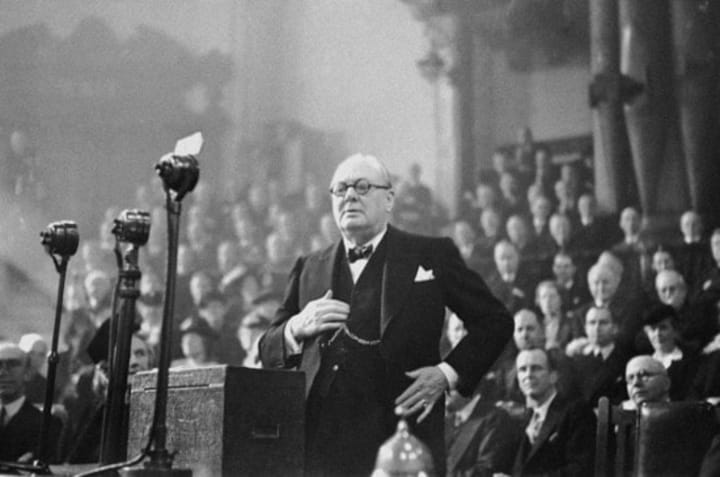
In the aftermath of these speeches and the carnage of war which were to follow both speeches, both men proceeded to stand from the ashes and smile; and the contextualization of knowing that their journey of becoming leaders by trial and by endurance of adversity properly establishes how the theory of leaders being created from experience, and not by there mere act of birth, is most prevalent in human society, regardless if it is the fifteenth century or the twentieth century.
Works Cited
- Cannadine, D. (1989). Blood, Toil, Tears, and Sweat: The Speeches of Winston Churchill. Boston, MA: Houghton Mifflin Company
- Churchill, W. (1930). My Early Life, 1874-1904. London, England: The Reprint Society
- Churchill, W. (1948). The Gathering Storm: The Second World War. Boston, MA: Houghton Mifflin Company
- The Complete Works of William Shakespeare. (2014). San Diego, CA: Canterbury Classics
- Lyons, J. D., (n.d.). Churchill, Shakespeare, and Agincourt. Retrieved from Hillsdale College. website: https://winstonchurchill.hillsdale.edu/churchill-shakespeare-and-agincourt/
- Battle of Agincourt. (n.d.). In British Battles. Retrieved July 16, 2018, from https://www.britishbattles.com/one-hundred-years-war/battle-of-agincourt/
- Battle of Shrewsbury (1403). (n.d.). In Battlefields of Britain. Retrieved July 16, 2018, from http://www.battlefieldsofbritain.co.uk/battle_shrewsbury_1403.html
- Churchill's First World War. (n.d.). In Imperial War Museums. Retrieved July 16, 2018, from https://www.iwm.org.uk/history/churchills-first-world-war
- Henry V, Churchill, and the rhetoric of war. (n.d.). In Shakespeare Comic Books. Retrieved July 16, 2018, from https://www.shakespearecomics.com/blogs/shakespeare/henry-v-churchill-and-the-rhetoric-of-war
About the Creator
Jacob Herr
Born & raised in the American heartland, Jacob Herr graduated from Butler University with a dual degree in theatre & history. He is a rough, tumble, and humble artist, known to write about a little bit of everything.



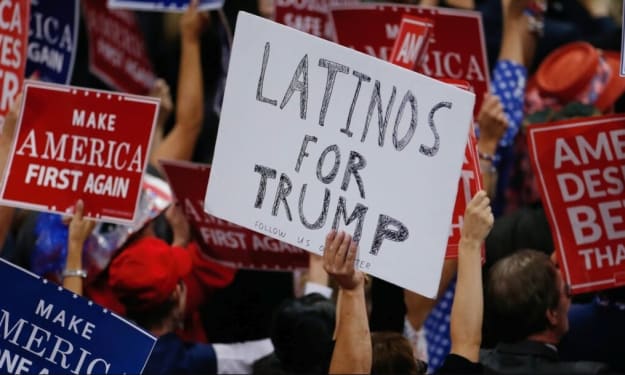


Comments
There are no comments for this story
Be the first to respond and start the conversation.